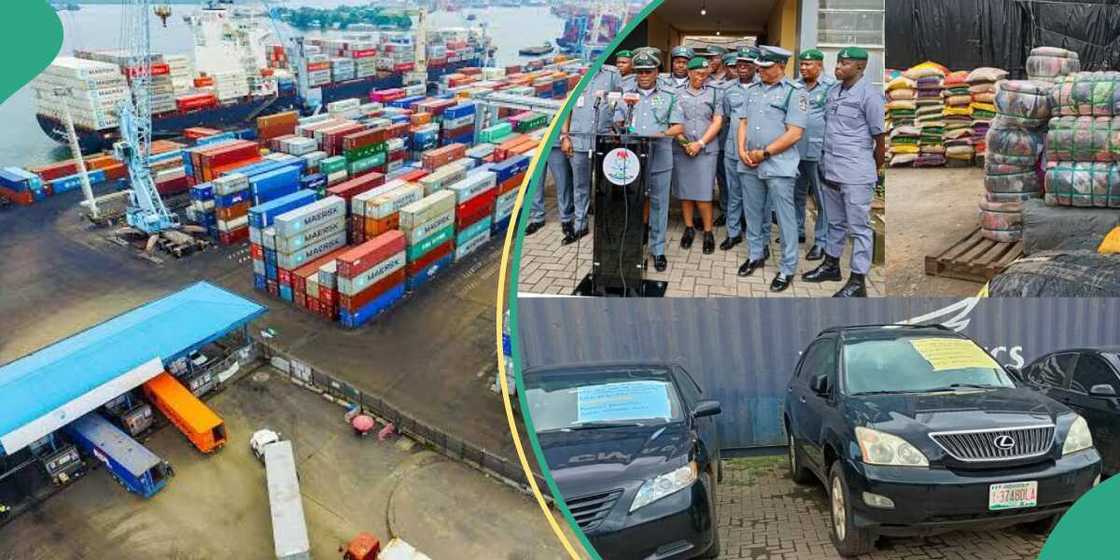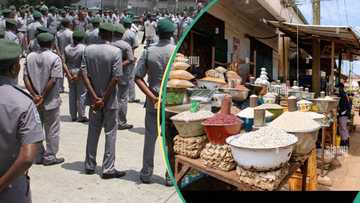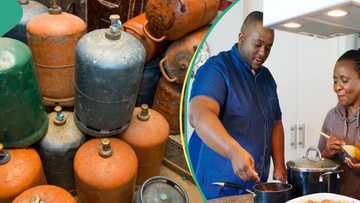Nigeria Customs Begins Distribution of Free Food Items to Nigerians, Lists Eligibility, Requirements
- The Nigeria Customs Service (NCS) has started the distribution of seized food items to Nigerians
- The agency said beneficiaries would need to provide valid identification, such as a National Identification Number (NIN)
- The service said that it is working with other relevant agencies to ensure there are no multiple benefits
PAY ATTENTION: The 2024 Business Leaders Awards Present Entrepreneurs that Change Nigeria for the Better. Check out their Stories!
Legit.ng’s Pascal Oparada has reported Tech, Energy, Stocks, Investment and the Economy for over a decade
The Nigeria Customs Service (NCS) has begun the distribution of seized food items across Nigeria.
The comptroller-general of Customs, Adewale Adeniyi, stated that the Nigerian government had asked that the seized food items be distributed to ease Nigerians' current hardship.

Source: Facebook
Customs lists NIN as requirement for eligibility
At the flag-off of events in Lagos on Thursday, February 22, 2024, the Customs boss emphasised that the service is collaborating with other agencies to distribute the seized food items to indigent Nigerians directly.

Read also
N10k for 25kg bag: Nigeria Customs begins sale of cheap rice, other food items, shares location
PAY ATTENTION: Click “See First” under the “Following” tab to see Legit.ng News on your Facebook News Feed!
Adeniyi noted that the beneficiaries must provide a verifiable National Identification Number (NIN) to access the relief items.
He said:
“Our target includes artisans, teachers, religious organisations and other Nigerians within the area of customs operations, including the border areas.
“This distribution is intended to be directed directly to members of organisations that have structures to ensure the maximum impact of the exercise.
“The effort of the distribution is to ensure robust security protocol throughout the process as officers will closely monitor the entire supply chain to prevent any misuse or possible diversion of food items.”
Customs to collaborate with other security agencies
According to him, the gesture was part of the government’s efforts to reduce the high cost of food prices in Nigeria.
Reports say that Adeniyi stated that the service collaborates with other government agencies, while customs is the lead agency as the food items are with it.
Adeniyi assured that the distributed rice has been certified fit and safe for consumption by the National Agency for Food and Drug Administration and Control (NAFDAC).
Per the customs helmsman, the rice has been repackaged into 25k kg bags to reach more people.
Customs designates 10 distribution points
The agency has also earmarked ten distribution points, requiring Nigerians to provide their NIN to prevent multiple benefits, Adeniyi stated.
He asked Nigerians to report misuse, abuse, or unauthorised resale, saying the agency is ready to arrest and prosecute those found guilty of storing food items.
In a previous report by Legit.ng the Nigeria Customs promised to share seized items with Nigerians following the worsening food crisis in the country.
The announcement was greeted with mixed reactions, with many Nigerians saying the move would be counterproductive as the items might end up in a few hands.
FG Moves to Set Prices of food items
Legit.ng reported that the Nigerian government has announced that it has concluded plans to determine the prices of food items in the country.
The minister of Agriculture and Food Security, Abubakar Kyari, disclosed this in Abuja and hinted at the Nigerian government's projects and initiatives to reduce the rising cost of food in Nigeria.
Kyari stated that farmers have been registered for summer farming via the National Agricultural Growth Scheme and AgroPocket (NAGS-AP), saying that the 120,000 hectares of wheat have been cultivated in Jigawa state under the African Development Bank (AfDB) 50% free agriculture scheme.
PAY ATTENTION: Stay Informed and follow us on Google News!
Source: Legit.ng



